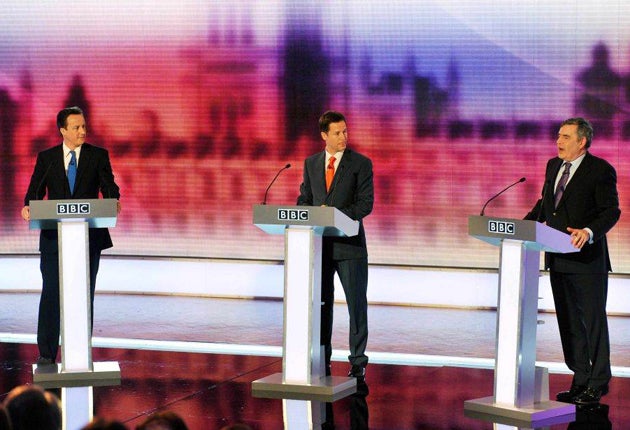Ian Burrell: There are more serious elements in a shifting press for the Prime Minister to worry about
Media Watch

Gordon Brown had barely uttered the words "Today I want to talk about the economy" during a visit yesterday to a West Midlands factory, when The Economist magazine made its own contribution to that discussion, by formally endorsing the Conservatives.
On the day of a critical televised debate which had Brown's handling of Britain's finances as its central theme, this was not what the Prime Minister needed. The last time he had experienced such apparently spiteful timing was in September when, hours after he had delivered his speech to Labour's annual conference, The Sun very publicly announced that it was transferring its allegiance to the Tories.
The Sun's coverage of this election campaign is exemplified by a request sent out by one of the paper's journalists Jenna Sloan (and leaked to the Liberal Conspiracy website), seeking "case studies" from the nursing and teaching professions willing to tell their stories for £100 a pop. Jenna had one stipulation: "Both must be willing to say why they feel let down by the Labour government, and why they are thinking about voting Conservative." The paper hopes that Rochdale pensioner Gillian Duffy could be persuaded to talk about a similar voyage of transition.
Brown need not fear that The Economist will express its opposition with the same bullyboy tactics deployed by the Wapping red-top over the past months, but in other respects the snubbing of the former Chancellor by the 167-year-old weekly is more damaging.
It is not, as a leader in The Economist pointed out yesterday, merely a question of an organ of business lending its support to a natural ally on the right. At the last election the magazine supported Labour. "The Economist has no ancestral fealty to any party, but an enduring prejudice in favour of liberalism," it said.
For The Economist, the deciding issue is the willingness to confront the "liberty-destroying Leviathan" of public spending. In spite of acknowledging that Brown "saved the banks" and "did as much as any leader to help avert a global depression", the editor-in-chief John Micklethwait and his team have concluded that the Conservatives are best placed to cut the size of government.
As the Prime Minister seeks to persuade the electorate that a Tory government would jeopardise economic recovery, his claims could be further undermined next week if The Financial Times, which owns half of The Economist, also backs David Cameron. When the Tory leader was a member of the Bullingdon Club at Oxford, the chairman of that elite dining society was Jonathan Ford, the new chief leader writer of the Pink'Un.
Subscribe to Independent Premium to bookmark this article
Want to bookmark your favourite articles and stories to read or reference later? Start your Independent Premium subscription today.

Join our commenting forum
Join thought-provoking conversations, follow other Independent readers and see their replies